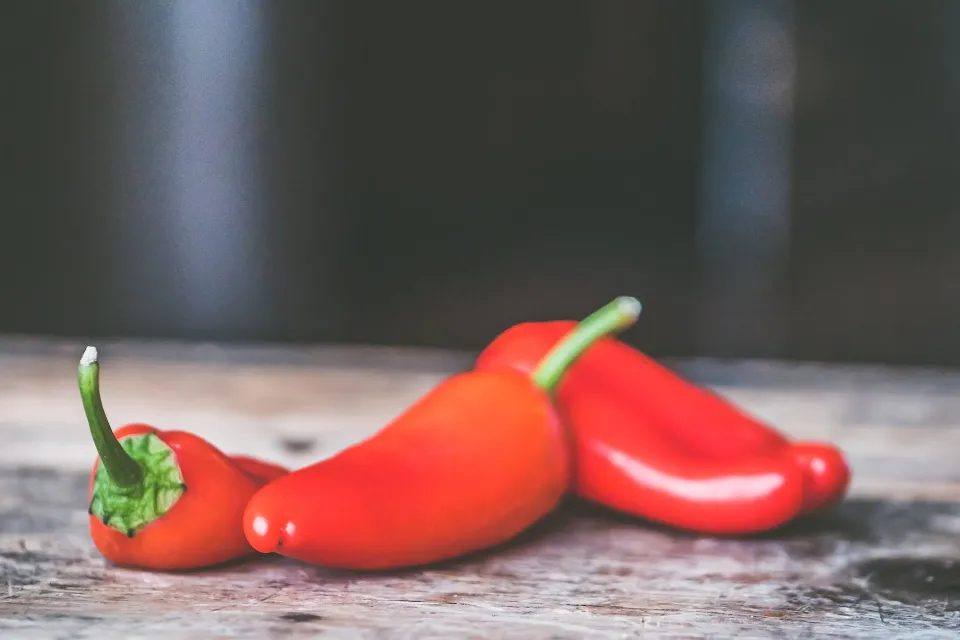
We all respond to spicy food differently. Others will experience a hot flush at even the slightest hint of chili in their food, while some relish the challenge of a tongue-meltingly hot curry.
Why does eating something spicy make you sweat or give you a stomach ache? Capsaicin, which is released as a fine spray when you bite into foods containing it, activates heat receptors in the skin, deceiving the nervous system into believing you are overheating.
For more information, please continue reading.
Further Reading:
How Does Spicy Food Work?
Our bodies have receptors located near our mouths and skin that typically become active when exposed to heat from the environment, usually over 109°F. However, that is heat as determined by a thermometer, not by our taste buds.
So what is it about a “hot” pepper, whether it’s no warmer than room temperature or even refrigerated, that sends us running for a glass of water after we take a bite?
The substance found in “hot” food that humans react to in this way is called capsaicin. When in contact, capsaicin causes these same receptors to fire up, causing a burning sensation that can affect the mouth, stomach, eyes, and skin.
At extremely high concentrations, capsaicin can also make you feel sick or make breathing difficult.
How “Hot” Can These Foods Get?
Scoville Heat Units (SHUs), a measure of how sensitive we are to capsaicin, are used to quantify the level of heat in food. This metric, created in 1912 by Wilbur Scoville, may not be as precise as liquid chromatography techniques, but it is still accepted as the gold standard for gauging how hot something is.

A bell pepper places 0 SHU on the scale. Other well-known peppers include the habanero, which can measure up to 350,000 SHU, the jalapeno, which can measure up to 10,000 SHU, and the banana pepper, which can reach 900 SHU.
Actually, there are pepper varieties with a SHU as high as 2,200,000! By crossing different pepper strains, growers can produce these extreme varieties with desired characteristics, such as sweetness or heat.
What Does Spicy Food Do to Your Body?
Spicy food can do something to your body, such as sweating and heartburn.
Digestion Issues
The impact a spicy meal has on the digestive system is frequently used to evaluate it. In fact, terms like “Delhi belly” have been coined to describe the perceived reaction a hot curry can cause. But is what’s going on inside your body really being caused by spice?
Irritable bowel syndrome (IBS) and Crohn’s disease sufferers were more likely to be spice sensitive, according to a 2008 study published in the British Medical Journal. It’s crucial to keep in mind that many spicy dishes contain a variety of ingredients, many of which are known to cause digestive problems.
For instance, any bathroom-related effects you experience as a result of eating spicy food could all be attributed to red meat, dairy, and other fatty foods.
Sweating
Don’t worry if you find yourself wiping the sweat off your forehead after eating because it was so hot. When you eat spicy food, you naturally have this reaction.
Your brain detects overheating because of the capsaicin in chilies. Sweating is naturally produced whenever this occurs to keep you cool.
Of course, the temperature of the room might not be that hot if you’re sitting at home or in a restaurant. As a result, your sweat doesn’t evaporate, which explains why you need to wipe your face so frequently, even after finishing your meal.
Runny Nose
Anything harmful that tries to enter your body is successfully blocked by your nose. There are actions it takes to stop foreign objects from getting in or to aid the body in getting rid of them as quickly as possible if it detects a foreign object, such as dust or bacteria.
The capsaicin in spices causes the mucous membrane in your nasal cavity to itch, and as a result, your nose automatically defends itself by sneezing. Since you’re seated at the dinner table, it’s not ideal in this situation to use mucus (snot) to solve the issue.
Heartburn

While it’s common knowledge that spicy foods can cause heartburn, science doesn’t actually support this. Indigestion takes the form of heartburn, which is a burning sensation in the throat brought on by stomach acid or partially digested food.
There are many potential causes of heartburn, including fatty foods, alcohol, carbonated beverages, and non-dietary factors like smoking, hernias, and stress.
Stomach Problems
Once more, symptoms like stomach cramps are sometimes attributed to a fiery curry, but your discomfort may not actually be brought on by the spicy ingredients. There is a ton of evidence that eating spicy food won’t upset the stomach, not to mention the fact that it is so prevalent in many different global cuisines.
However, if you already have a medical condition, such as a stomach ulcer, spicy food may aggravate it further and prolong the healing process.
Is Spicy Food Good for You?
Most of the time, spicy food is perfectly acceptable as part of a nutritious, balanced diet. Once you’ve established your tolerance for spices, they won’t hurt you and may even be beneficial to your health.
Let’s examine a few of the most notable claims.
- You could live longer
- You could lose weight
- You could end up with a healthier heart
- Your arthritis could improve
Conclusions: Spicy Food
Spicy food contains chemicals that trick the body into turning up its internal air conditioner, eliciting reactions from head to toe and affecting everything from the respiratory to the circulatory systems.
We hope that this has clarified some of your concerns about the impact of spicy food on your body.
